Wireless Test Equipment Market Insights 2025, Analysis and Forecast to 2030, by Manufacturers, Regions, Technology, Application, Product Type
- Single User License (1 Users) $ 3,200
- Team License (2~5 Users) $ 4,200
- Corporate License (>5 Users) $ 5,200
Introduction
Wireless test equipment, comprising testing software, instruments, and microwave anechoic chambers/electromagnetic shielding boxes, is critical for validating the performance, interoperability, and compliance of wireless communication systems. This technology-intensive industry, with high entry barriers due to R&D, capital, and standards, is dominated by U.S. and Japanese firms like Keysight and Anritsu. Serving communications and electronics manufacturing, it supports telecom operators, equipment makers like Huawei, and device manufacturers like Apple. The global 5G rollout, with 4.25 million base stations in China (60% of global total) and 36 billion connections by Q2 2025, drives demand for testing system-in-package (SiP), modules, PCBs, and SMT processes. Applications include smartphones, IoT, and peripherals, with testing ensuring RF, protocol, and electromagnetic compatibility. The market faces challenges from high costs, supply chain disruptions, and evolving standards, but benefits from 5G, IoT, and automotive growth. Key players like Teradyne and Rohde & Schwarz lead, with Asia Pacific as the growth engine.
Market Size and Growth Forecast
The global Wireless Test Equipment market is projected to reach a market size of 12.0–15.0 billion USD by 2025, with an estimated CAGR of 5%–7% through 2030. Growth is driven by 5G infrastructure, IoT adoption, and regulatory requirements.
Regional Analysis
Asia Pacific is expected to grow at a CAGR of 6%–8%, led by China, South Korea, and Japan. China’s 4.25 million 5G base stations and electronics manufacturing hub drive demand, though trade restrictions pose risks. South Korea’s 5G device exports fuel testing, tempered by high costs. Japan’s telecom and IoT growth supports sales, constrained by labor shortages.
North America is projected to grow at a CAGR of 4.5%–6.5%, with the U.S. leading. The U.S. drives 5G and IoT testing, supported by Apple and Qualcomm, but faces chip shortages. Canada’s telecom upgrades support demand, limited by scale.
Europe is anticipated to grow at a CAGR of 4%–6%, with Germany, France, and the UK as key markets. Germany’s automotive and IoT testing drives demand, though energy costs hinder growth. France’s 5G rollout supports sales, while the UK’s telecom upgrades fuel adoption, constrained by Brexit.
South America is expected to grow at a CAGR of 3.5%–5.5%, with Brazil and Mexico contributing. Brazil’s 5G rollout drives testing, limited by economic volatility. Mexico’s electronics manufacturing supports growth, hindered by infrastructure gaps.
The Middle East and Africa are projected to grow at a CAGR of 3%–5%, with the UAE and South Africa leading. The UAE’s smart city projects fuel demand, while South Africa’s 5G adoption supports growth, constrained by logistics.
Application Analysis
Smartphones: Expected to grow at a CAGR of 5.5%–7.5%, driven by 5G device testing (36 billion connections). Trends focus on mmWave and multi-band validation, led by Huawei and Xiaomi.
Tablets: Projected to grow at a CAGR of 4%–6%, with testing for Wi-Fi 6 and 5G. Growth is moderate due to limited innovation.
Notebooks & Laptops: Expected to grow at a CAGR of 4.5%–6.5%, driven by Wi-Fi 6E and remote work. Testing ensures protocol compatibility.
Peripherals: Projected to grow at a CAGR of 3.5%–5.5%, with testing for wireless mice and headsets. Growth is niche but steady.
IoT: Expected to grow at a CAGR of 6.5%–8.5%, fueled by 30 billion devices by 2030. Testing focuses on low-power protocols like NB-IoT.
Others: Projected to grow at a CAGR of 3%–5%, including automotive and aerospace testing. Trends emphasize V2X and satellite systems.
Type Analysis
SiP: Expected to grow at a CAGR of 6%–8%, critical for integrated 5G chip testing. Trends focus on compact, high-frequency solutions.
Module: Projected to grow at a CAGR of 5.5%–7.5%, used in IoT and smartphone modules. Testing ensures interoperability.
PCB: Expected to grow at a CAGR of 4.5%–6.5%, vital for electronics manufacturing. Trends emphasize high-density board testing.
SMT: Projected to grow at a CAGR of 4%–6%, used in surface-mount production. Testing ensures manufacturing precision.
Others: Expected to grow at a CAGR of 3.5%–5.5%, including custom test setups. Growth is niche but stable.
Key Market Players
Keysight Technologies: A U.S. company, Keysight offers scalable 5G and IoT test platforms, emphasizing automation.
Rohde & Schwarz: A German firm, Rohde & Schwarz provides high-precision RF and network analyzers for telecom.
Anritsu: A Japanese company, Anritsu delivers compact 5G and IoT test solutions, focusing on portability.
Teradyne: A U.S. firm, Teradyne specializes in automated test equipment for SiP and semiconductors.
National Instruments: A U.S. company, National Instruments offers modular test systems for wireless devices.
Porter’s Five Forces Analysis
●Threat of New Entrants: Low. High R&D, capital, and standards barriers, dominated by Keysight, limit entrants, though Chinese firms like Welzek enter with support.
●Threat of Substitutes: Low. Wired testing is impractical for wireless systems, ensuring demand for specialized equipment.
●Bargaining Power of Buyers: Moderate. Telecom giants like Huawei negotiate aggressively, but 5G testing’s complexity limits options for buyers.
●Bargaining Power of Suppliers: Moderate. Dependency on semiconductors and precision components increases supplier power, mitigated by Rohde & Schwarz’s integration.
●Competitive Rivalry: High. Keysight, Anritsu, and Teradyne compete on automation, precision, and cost, driving innovation but pressuring margins.
Market Opportunities and Challenges
Opportunities
●5G Expansion: 36 billion connections drive testing demand, benefiting Keysight and Teradyne.
●IoT Growth: 30 billion devices by 2030 require low-power testing, offering opportunities for National Instruments.
●Automotive Testing: V2X and ADAS testing create demand, benefiting Anritsu.
●Regulatory Needs: Stricter 5G standards in Europe and China support testing, benefiting Rohde & Schwarz.
●Emerging Markets: India’s 5G rollout drives affordable testing demand, benefiting Welzek.
Challenges
●High Costs: Equipment prices ($50,000–$500,000) limit adoption, challenging Teradyne.
●Supply Chain Disruptions: Semiconductor shortages impact production, affecting Keysight.
●Evolving Standards: Rapid 5G/6G shifts require constant R&D, pressuring Anritsu.
●Geopolitical Tensions: U.S.-China trade issues disrupt supply chains, challenging Rohde & Schwarz.
●Talent Shortage: Complex testing requires skilled labor, impacting National Instruments’ growth.
Chapter 1 Executive Summary
Chapter 2 Abbreviation and Acronyms
Chapter 3 Preface
3.1 Research Scope
3.2 Research Sources
3.2.1 Data Sources
3.2.2 Assumptions
3.3 Research Method
Chapter 4 Market Landscape
4.1 Market Overview
4.2 Classification/Types
4.3 Application/End Users
Chapter 5 Market Trend Analysis
5.1 Introduction
5.2 Drivers
5.3 Restraints
5.4 Opportunities
5.5 Threats
Chapter 6 Industry Chain Analysis
6.1 Upstream/Suppliers Analysis
6.2 Wireless Test Equipment Analysis
6.2.1 Technology Analysis
6.2.2 Cost Analysis
6.2.3 Market Channel Analysis
6.3 Downstream Buyers/End Users
Chapter 7 Latest Market Dynamics
7.1 Latest News
7.2 Merger and Acquisition
7.3 Planned/Future Project
7.4 Policy Dynamics
Chapter 8 Historical and Forecast Wireless Test Equipment Market in North America (2020-2030)
8.1 Wireless Test Equipment Market Size
8.2 Wireless Test Equipment Market by End Use
8.3 Competition by Players/Suppliers
8.4 Wireless Test Equipment Market Size by Type
8.5 Key Countries Analysis
8.5.1 United States
8.5.2 Canada
8.5.3 Mexico
Chapter 9 Historical and Forecast Wireless Test Equipment Market in South America (2020-2030)
9.1 Wireless Test Equipment Market Size
9.2 Wireless Test Equipment Market by End Use
9.3 Competition by Players/Suppliers
9.4 Wireless Test Equipment Market Size by Type
9.5 Key Countries Analysis
9.5.1 Brazil
9.5.2 Argentina
9.5.3 Chile
9.5.4 Peru
Chapter 10 Historical and Forecast Wireless Test Equipment Market in Asia & Pacific (2020-2030)
10.1 Wireless Test Equipment Market Size
10.2 Wireless Test Equipment Market by End Use
10.3 Competition by Players/Suppliers
10.4 Wireless Test Equipment Market Size by Type
10.5 Key Countries Analysis
10.5.1 China
10.5.2 India
10.5.3 Japan
10.5.4 South Korea
10.5.5 Southest Asia
10.5.6 Australia
Chapter 11 Historical and Forecast Wireless Test Equipment Market in Europe (2020-2030)
11.1 Wireless Test Equipment Market Size
11.2 Wireless Test Equipment Market by End Use
11.3 Competition by Players/Suppliers
11.4 Wireless Test Equipment Market Size by Type
11.5 Key Countries Analysis
11.5.1 Germany
11.5.2 France
11.5.3 United Kingdom
11.5.4 Italy
11.5.5 Spain
11.5.6 Belgium
11.5.7 Netherlands
11.5.8 Austria
11.5.9 Poland
11.5.10 Russia
Chapter 12 Historical and Forecast Wireless Test Equipment Market in MEA (2020-2030)
12.1 Wireless Test Equipment Market Size
12.2 Wireless Test Equipment Market by End Use
12.3 Competition by Players/Suppliers
12.4 Wireless Test Equipment Market Size by Type
12.5 Key Countries Analysis
12.5.1 Egypt
12.5.2 Israel
12.5.3 South Africa
12.5.4 Gulf Cooperation Council Countries
12.5.5 Turkey
Chapter 13 Summary For Global Wireless Test Equipment Market (2020-2025)
13.1 Wireless Test Equipment Market Size
13.2 Wireless Test Equipment Market by End Use
13.3 Competition by Players/Suppliers
13.4 Wireless Test Equipment Market Size by Type
Chapter 14 Global Wireless Test Equipment Market Forecast (2025-2030)
14.1 Wireless Test Equipment Market Size Forecast
14.2 Wireless Test Equipment Application Forecast
14.3 Competition by Players/Suppliers
14.4 Wireless Test Equipment Type Forecast
Chapter 15 Analysis of Global Key Vendors
15.1 Teradyne
15.1.1 Company Profile
15.1.2 Main Business and Wireless Test Equipment Information
15.1.3 SWOT Analysis of Teradyne
15.1.4 Teradyne Wireless Test Equipment Sales, Revenue, Price and Gross Margin (2020-2025)
15.2 Rohde & Schwarz GmbH & Co. KG
15.2.1 Company Profile
15.2.2 Main Business and Wireless Test Equipment Information
15.2.3 SWOT Analysis of Rohde & Schwarz GmbH & Co. KG
15.2.4 Rohde & Schwarz GmbH & Co. KG Wireless Test Equipment Sales, Revenue, Price and Gross Margin (2020-2025)
15.3 Anritsu Company
15.3.1 Company Profile
15.3.2 Main Business and Wireless Test Equipment Information
15.3.3 SWOT Analysis of Anritsu Company
15.3.4 Anritsu Company Wireless Test Equipment Sales, Revenue, Price and Gross Margin (2020-2025)
15.4 Keysight Technologies Inc.
15.4.1 Company Profile
15.4.2 Main Business and Wireless Test Equipment Information
15.4.3 SWOT Analysis of Keysight Technologies Inc.
15.4.4 Keysight Technologies Inc. Wireless Test Equipment Sales, Revenue, Price and Gross Margin (2020-2025)
15.5 National Instruments Corporation
15.5.1 Company Profile
15.5.2 Main Business and Wireless Test Equipment Information
15.5.3 SWOT Analysis of National Instruments Corporation
15.5.4 National Instruments Corporation Wireless Test Equipment Sales, Revenue, Price and Gross Margin (2020-2025)
15.6 Welzek
15.6.1 Company Profile
15.6.2 Main Business and Wireless Test Equipment Information
15.6.3 SWOT Analysis of Welzek
15.6.4 Welzek Wireless Test Equipment Sales, Revenue, Price and Gross Margin (2020-2025)
Please ask for sample pages for full companies list
Table Research Scope Of Wireless Test Equipment Report
Table Data Sources Of Wireless Test Equipment Report
Table Major Assumptions Of Wireless Test Equipment Report
Table Wireless Test Equipment Classification
Table Wireless Test Equipment Applications
Table Drivers Of Wireless Test Equipment Market
Table Restraints Of Wireless Test Equipment Market
Table Opportunities Of Wireless Test Equipment Market
Table Threats Of Wireless Test Equipment Market
Table Raw Materials Suppliers
Table Different Production Methods Of Wireless Test Equipment
Table Cost Structure Analysis Of Wireless Test Equipment
Table Key End Users
Table Latest News Of Wireless Test Equipment Market
Table Merger And Acquisition
Table Planned/Future Project Of Wireless Test Equipment Market
Table Policy Of Wireless Test Equipment Market
Table 2020-2030 North America Wireless Test Equipment Market Size
Table 2020-2030 North America Wireless Test Equipment Market Size By Application
Table 2020-2025 North America Wireless Test Equipment Key Players Revenue
Table 2020-2025 North America Wireless Test Equipment Key Players Market Share
Table 2020-2030 North America Wireless Test Equipment Market Size By Type
Table 2020-2030 United States Wireless Test Equipment Market Size
Table 2020-2030 Canada Wireless Test Equipment Market Size
Table 2020-2030 Mexico Wireless Test Equipment Market Size
Table 2020-2030 South America Wireless Test Equipment Market Size
Table 2020-2030 South America Wireless Test Equipment Market Size By Application
Table 2020-2025 South America Wireless Test Equipment Key Players Revenue
Table 2020-2025 South America Wireless Test Equipment Key Players Market Share
Table 2020-2030 South America Wireless Test Equipment Market Size By Type
Table 2020-2030 Brazil Wireless Test Equipment Market Size
Table 2020-2030 Argentina Wireless Test Equipment Market Size
Table 2020-2030 Chile Wireless Test Equipment Market Size
Table 2020-2030 Peru Wireless Test Equipment Market Size
Table 2020-2030 Asia & Pacific Wireless Test Equipment Market Size
Table 2020-2030 Asia & Pacific Wireless Test Equipment Market Size By Application
Table 2020-2025 Asia & Pacific Wireless Test Equipment Key Players Revenue
Table 2020-2025 Asia & Pacific Wireless Test Equipment Key Players Market Share
Table 2020-2030 Asia & Pacific Wireless Test Equipment Market Size By Type
Table 2020-2030 China Wireless Test Equipment Market Size
Table 2020-2030 India Wireless Test Equipment Market Size
Table 2020-2030 Japan Wireless Test Equipment Market Size
Table 2020-2030 South Korea Wireless Test Equipment Market Size
Table 2020-2030 Southeast Asia Wireless Test Equipment Market Size
Table 2020-2030 Australia Wireless Test Equipment Market Size
Table 2020-2030 Europe Wireless Test Equipment Market Size
Table 2020-2030 Europe Wireless Test Equipment Market Size By Application
Table 2020-2025 Europe Wireless Test Equipment Key Players Revenue
Table 2020-2025 Europe Wireless Test Equipment Key Players Market Share
Table 2020-2030 Europe Wireless Test Equipment Market Size By Type
Table 2020-2030 Germany Wireless Test Equipment Market Size
Table 2020-2030 France Wireless Test Equipment Market Size
Table 2020-2030 United Kingdom Wireless Test Equipment Market Size
Table 2020-2030 Italy Wireless Test Equipment Market Size
Table 2020-2030 Spain Wireless Test Equipment Market Size
Table 2020-2030 Belgium Wireless Test Equipment Market Size
Table 2020-2030 Netherlands Wireless Test Equipment Market Size
Table 2020-2030 Austria Wireless Test Equipment Market Size
Table 2020-2030 Poland Wireless Test Equipment Market Size
Table 2020-2030 Russia Wireless Test Equipment Market Size
Table 2020-2030 Mea Wireless Test Equipment Market Size
Table 2020-2030 Mea Wireless Test Equipment Market Size By Application
Table 2020-2025 Mea Wireless Test Equipment Key Players Revenue
Table 2020-2025 Mea Wireless Test Equipment Key Players Market Share
Table 2020-2030 Mea Wireless Test Equipment Market Size By Type
Table 2020-2030 Egypt Wireless Test Equipment Market Size
Table 2020-2030 Israel Wireless Test Equipment Market Size
Table 2020-2030 South Africa Wireless Test Equipment Market Size
Table 2020-2030 Gulf Cooperation Council Countries Wireless Test Equipment Market Size
Table 2020-2030 Turkey Wireless Test Equipment Market Size
Table 2020-2025 Global Wireless Test Equipment Market Size By Region
Table 2020-2025 Global Wireless Test Equipment Market Size Share By Region
Table 2020-2025 Global Wireless Test Equipment Market Size By Application
Table 2020-2025 Global Wireless Test Equipment Market Share By Application
Table 2020-2025 Global Wireless Test Equipment Key Vendors Revenue
Table 2020-2025 Global Wireless Test Equipment Key Vendors Market Share
Table 2020-2025 Global Wireless Test Equipment Market Size By Type
Table 2020-2025 Global Wireless Test Equipment Market Share By Type
Table 2025-2030 Global Wireless Test Equipment Market Size By Region
Table 2025-2030 Global Wireless Test Equipment Market Size Share By Region
Table 2025-2030 Global Wireless Test Equipment Market Size By Application
Table 2025-2030 Global Wireless Test Equipment Market Share By Application
Table 2025-2030 Global Wireless Test Equipment Key Vendors Revenue
Table 2025-2030 Global Wireless Test Equipment Key Vendors Market Share
Table 2025-2030 Global Wireless Test Equipment Market Size By Type
Table 2025-2030 Wireless Test Equipment Global Market Share By Type
Figure Market Size Estimated Method
Figure Major Forecasting Factors
Figure Wireless Test Equipment Picture
Figure 2020-2030 North America Wireless Test Equipment Market Size And Cagr
Figure 2020-2030 South America Wireless Test Equipment Market Size And Cagr
Figure 2020-2030 Asia & Pacific Wireless Test Equipment Market Size And Cagr
Figure 2020-2030 Europe Wireless Test Equipment Market Size And Cagr
Figure 2020-2030 Mea Wireless Test Equipment Market Size And Cagr
Figure 2020-2025 Global Wireless Test Equipment Market Size And Growth Rate
Figure 2025-2030 Global Wireless Test Equipment Market Size And Growth Rate
Research Methodology
- Market Estimated Methodology:
Bottom-up & top-down approach, supply & demand approach are the most important method which is used by HDIN Research to estimate the market size.
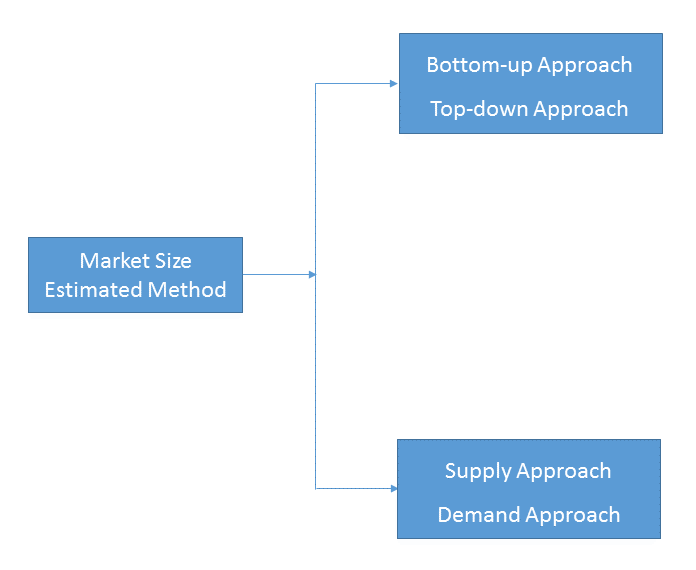
1)Top-down & Bottom-up Approach
Top-down approach uses a general market size figure and determines the percentage that the objective market represents.
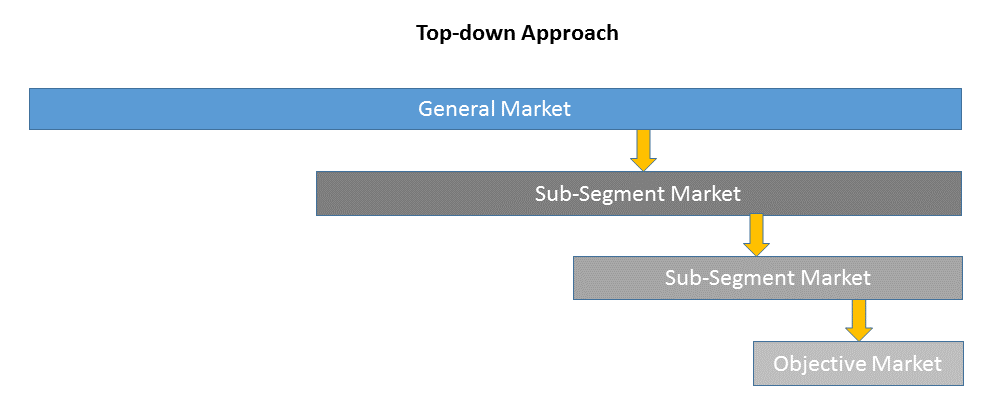
Bottom-up approach size the objective market by collecting the sub-segment information.

2)Supply & Demand Approach
Supply approach is based on assessments of the size of each competitor supplying the objective market.
Demand approach combine end-user data within a market to estimate the objective market size. It is sometimes referred to as bottom-up approach.
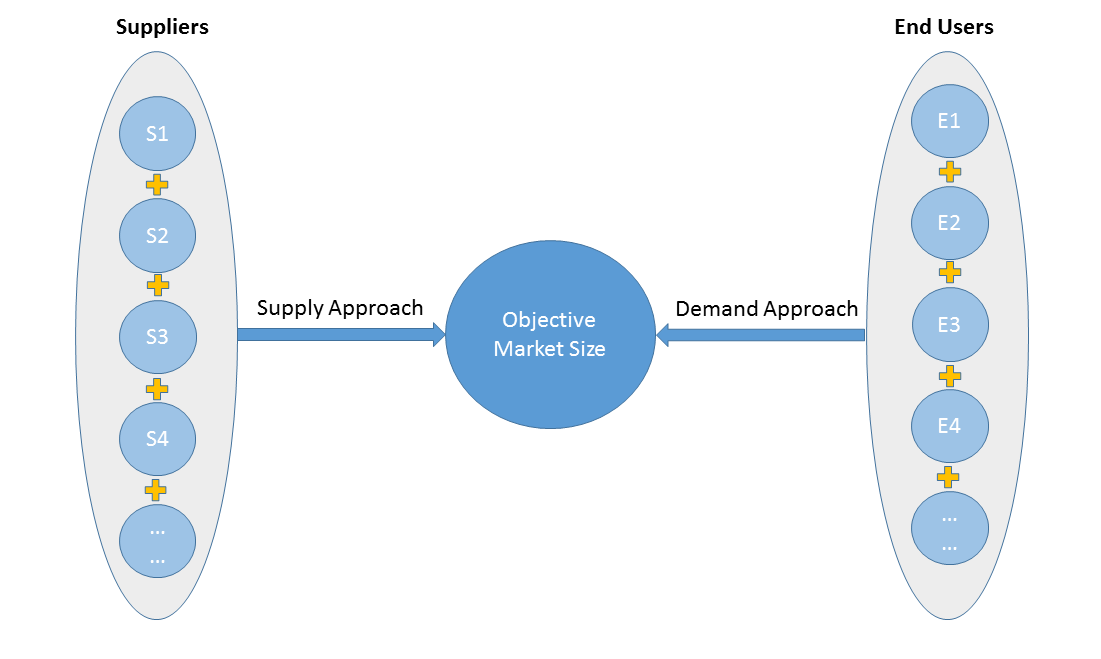
- Forecasting Methodology
- Numerous factors impacting the market trend are considered for forecast model:
- New technology and application in the future;
- New project planned/under contraction;
- Global and regional underlying economic growth;
- Threatens of substitute products;
- Industry expert opinion;
- Policy and Society implication.
- Analysis Tools
1)PEST Analysis
PEST Analysis is a simple and widely used tool that helps our client analyze the Political, Economic, Socio-Cultural, and Technological changes in their business environment.
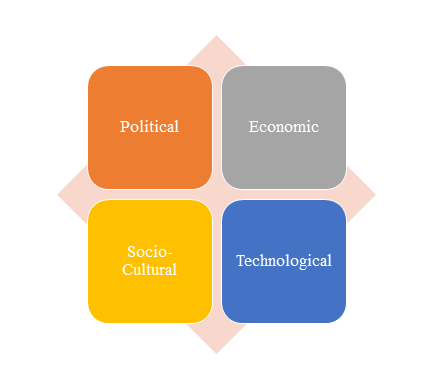
- Benefits of a PEST analysis:
- It helps you to spot business opportunities, and it gives you advanced warning of significant threats.
- It reveals the direction of change within your business environment. This helps you shape what you’re doing, so that you work with change, rather than against it.
- It helps you avoid starting projects that are likely to fail, for reasons beyond your control.
- It can help you break free of unconscious assumptions when you enter a new country, region, or market; because it helps you develop an objective view of this new environment.
2)Porter’s Five Force Model Analysis
The Porter’s Five Force Model is a tool that can be used to analyze the opportunities and overall competitive advantage. The five forces that can assist in determining the competitive intensity and potential attractiveness within a specific area.
- Threat of New Entrants: Profitable industries that yield high returns will attract new firms.
- Threat of Substitutes: A substitute product uses a different technology to try to solve the same economic need.
- Bargaining Power of Customers: the ability of customers to put the firm under pressure, which also affects the customer's sensitivity to price changes.
- Bargaining Power of Suppliers: Suppliers of raw materials, components, labor, and services (such as expertise) to the firm can be a source of power over the firm when there are few substitutes.
- Competitive Rivalry: For most industries the intensity of competitive rivalry is the major determinant of the competitiveness of the industry.
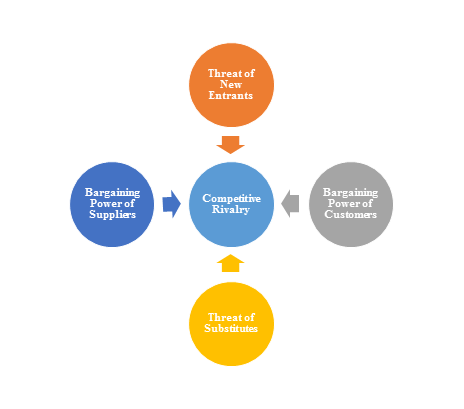
3)Value Chain Analysis
Value chain analysis is a tool to identify activities, within and around the firm and relating these activities to an assessment of competitive strength. Value chain can be analyzed by primary activities and supportive activities. Primary activities include: inbound logistics, operations, outbound logistics, marketing & sales, service. Support activities include: technology development, human resource management, management, finance, legal, planning.
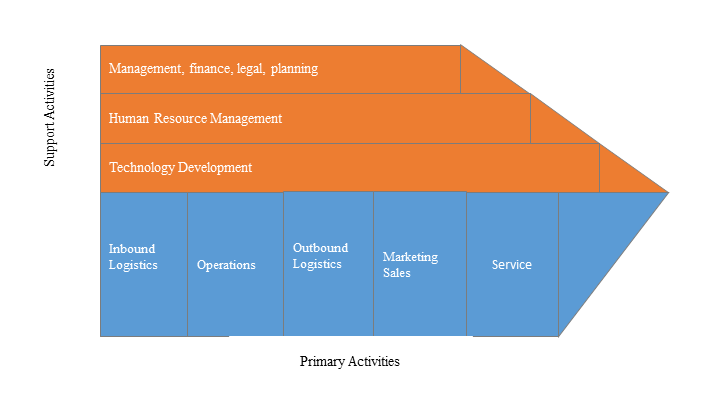
4)SWOT Analysis
SWOT analysis is a tool used to evaluate a company's competitive position by identifying its strengths, weaknesses, opportunities and threats. The strengths and weakness is the inner factor; the opportunities and threats are the external factor. By analyzing the inner and external factors, the analysis can provide the detail information of the position of a player and the characteristics of the industry.
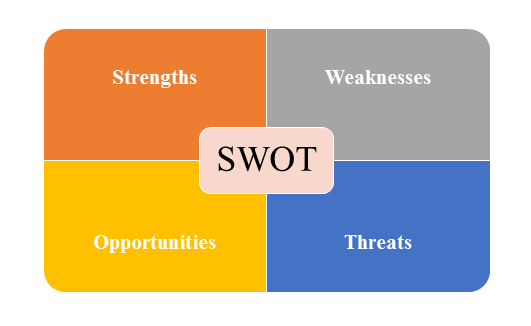
- Strengths describe what the player excels at and separates it from the competition
- Weaknesses stop the player from performing at its optimum level.
- Opportunities refer to favorable external factors that the player can use to give it a competitive advantage.
- Threats refer to factors that have the potential to harm the player.
- Data Sources
| Primary Sources | Secondary Sources |
|---|---|
| Face to face/Phone Interviews with market participants, such as: Manufactures; Distributors; End-users; Experts. Online Survey |
Government/International Organization Data: Annual Report/Presentation/Fact Book Internet Source Information Industry Association Data Free/Purchased Database Market Research Report Book/Journal/News |